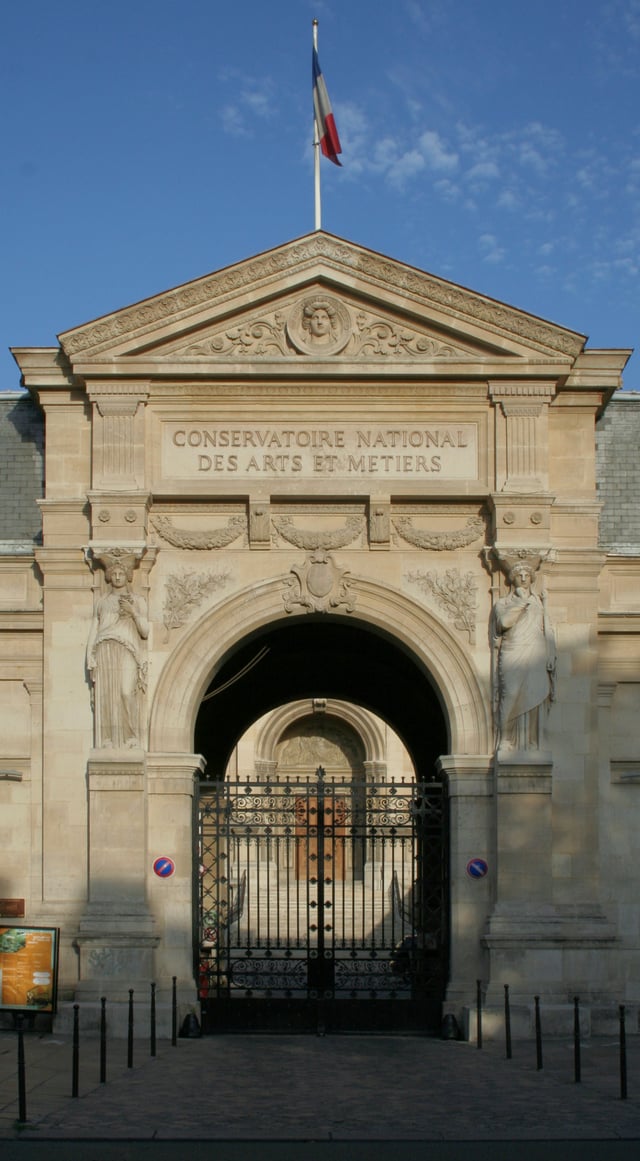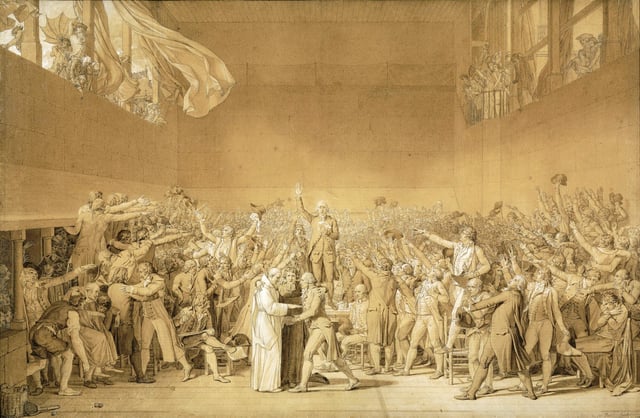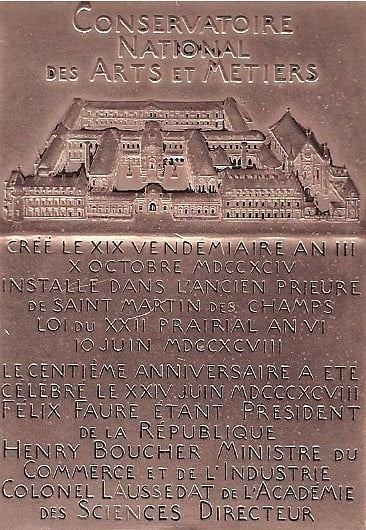Conservatoire national des arts et métiers

Conservatoire national des arts et métiers

| Motto | Docet omnes ubique (Latin) |
|---|---|
Motto in English | It teaches everyone everywhere |
| Type | Public, Grand établissement, Grande école |
| Established | 1794 (1794) |
| Chancellor | Olivier Faron (since 2013)[1] |
| President | Gérard Mestrallet[2] |
| Vice-Chancellor | Bernard Racimora[3] |
| Students | 110,000 (CNAM headquarters in Paris and CNAM centres in 160 other cities in France)[4][5] |
| Location | Paris , |
| Campus | Urban (for headquarters at St Martin street in Paris) |
| Language | French, English |
| Affiliations | CGE, HeSam Université, Elles Bougent |
| Website | www.cnam.fr [17] |

The main entrance.

Tennis Court Oath (1789) by David : the abbot Henri Grégoire, was a founding member of "Conservatoire National des Arts et Métiers", is shown with abbot black clothes in the drawing center.

Medal of the Conservatoire National des Arts et Métiers.
The Conservatoire national des arts et métiers (CNAM) is a doctoral degree-granting higher education establishment (or grand établissement) and Grande école in engineering, operated by the French government, dedicated to providing education and conducting research for the promotion of science and industry. It has a large museum of inventions accessible to the public.
It was founded on 10 October 1794, during the French Revolution.[6] It was first proposed by Abbé Henri Grégoire as a "depository for machines, models, tools, drawings, descriptions and books in all the areas of the arts and trades".[7] The deserted Saint-Martin-des-Champs Priory (and particularly its Gothic refectory by Pierre de Montereau) was selected as the site of collection, which formally opened in 1802.
Originally charged with the collection of inventions, it has since become an educational institution. At the present time, it is known primarily as a continuing education school for adults seeking engineering (multidisciplinary scientific program) and business degrees, proposing evening classes in a variety of topics.
The collection of inventions is now operated by the Musée des Arts et Métiers. The original Foucault pendulum was exhibited as part of the collection, but was moved to the Panthéon in 1995 during museum renovation. It was later reinstalled in the Musée des Arts et Métiers. On 6 April 2010,[8] the cable suspending the original pendulum bob snapped causing irreparable damage to the pendulum and to the marble flooring of the museum.[9]
The novel Foucault's Pendulum by Umberto Eco deals greatly with this establishment, as the Foucault pendulum hung in the museum plays a great role in the storyline. The novel was published in 1989 prior to the pendulum being moved back to the Panthéon during museum reconstruction.[10]
The Conservatoire National des Arts et Métiers is located at 292 rue Saint Martin, in the 3rd arrondissement of Paris, in the historical area of the city named Le Marais.
| Motto | Docet omnes ubique (Latin) |
|---|---|
Motto in English | It teaches everyone everywhere |
| Type | Public, Grand établissement, Grande école |
| Established | 1794 (1794) |
| Chancellor | Olivier Faron (since 2013)[1] |
| President | Gérard Mestrallet[2] |
| Vice-Chancellor | Bernard Racimora[3] |
| Students | 110,000 (CNAM headquarters in Paris and CNAM centres in 160 other cities in France)[4][5] |
| Location | Paris , |
| Campus | Urban (for headquarters at St Martin street in Paris) |
| Language | French, English |
| Affiliations | CGE, HeSam Université, Elles Bougent |
| Website | www.cnam.fr [17] |
Missions
The Conservatoire National des Arts et Métiers (Cnam) is a public institution of the French government, in the scientific, cultural and professional fields, with the status of "Grand Etablissement" (elite school). Under the supervision of the Ministry of Higher Education, it has 3 missions:
Training throughout life (Lifelong learning);
Technological research and innovation;
Dissemination of scientific and technical culture.
It is implemented in more than 150 cities in France and abroad. Cnam's motto is "Omnes docet ubique", which means "He (or it) teaches everyone everywhere."
Organization: two schools and fourteen departments
Since July 2010, Cnam has been organized in two distinct "Schools", each one with seven departments:
Industrial Sciences and Information Technology (Sciences industrielles et technologies de l'information, Siti), directed by William Dab: Chemicals, Food, Health, Environment, Risk; Civil Engineering, building, energetics; Computer science; Electronics, automation, control systems; Mathematical engineering; Measurement, analysis, quality, materials science. Mechanical and electrotechnical systems engineering;
Management and social sciences applied to firms (Management et sociétés, MS), directed by Jean-Claude Bouly: Accounting, Control and Audit; Economics, finance, banking, insurance; Management, innovation, foresight; Law, labour science, health, social intervention; Labour, career counseling, personal development, education; Culture, information, technology and society; Urban planning, trade, land and community development.
Training
The CNAM supports continuing education; it offers:.
Multidisciplinary programs;
1,350 modular programs;
1,500 specific sessions;
480 diplomas or certificates, from undergraduate to doctoral programs;
100,000 students enrolled in the entire network (75% employees, 13% experienced job seekers, 3% first job seekers, 9% students and others);
1 out of 5 students is trained by distance-learning programs, through information and communications technology.
All teachings are formatted to comply with the CNAM LMD (Licence-Master-Doctorate), and thus respecting the European Credit Transfer System.
Personalities of the Conservatoire National des Arts et Métiers
Léon Bourgeois, Nobel Peace Prize, Chairman of the Board of Directors of the Conservatoire National des Arts et Métiers.
Sadi Carnot, alumnus of the École Polytechnique and of the Conservatoire National des Arts et Métiers, physicist.
Paul Doumer, alumnus of the Conservatoire National des Arts et Métiers, President of the French Republic.[11]
Louis Pasteur, alumnus of the École Normale Supérieure and of the Conservatoire National des Arts et Métiers, chemist and biologist.
From 1995 to 2009, the Conservatoire National des Arts et Métiers hosted the weekly seminar of psychoanalyst Jacques-Alain Miller.
Jean Ferrat, alumnus of the Conservatoire national des arts et métiers, singer-songwriter.
Abbé Grégoire, founder of the Conservatoire national des arts et métiers.
Jean-Baptiste Say, alumnus of the Conservatoire national des arts et métiers, classical economist, professor with the Conservatoire national des arts et métiers and the Collège de France.
Alexandre Vandermonde, mathematician. From 1794 on, Vandermonde was member of the Conservatoire national des arts et métiers, examiner with the École polytechnique (France), professor with the École Normale Supérieure.
Jacques de Vaucanson, famous engineer, gave his personal collection to the CNAM as well as his name to an adjacent street.
Léon Vaudoyer, architecte of the CNAM building during the nineteenth century, together with the Institut de France building.
Jean Prouvé, French metal worker, self-taught architect and designer, CNAM professor from 1957 to 1970.
Alain Wisner
Tradition
Vandermonde : secret society of the Conservatoire National des Arts et Métiers.[12]
See also
(in French) Écoles de l'an III scientifiques